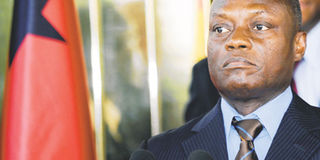Guinea-Bissau president lays off his government

A picture taken on June 11, 2014 shows Guinea-Bissau’s President Jose Mario Vaz holding a press conference at the presidential palace in Abidjan. Vaz has dismissed the government following a row with the prime minister in the troubled country. Photo | afp
What you need to know:
Despite concerns about the potential fallout from the crisis, life on Bissau streets carried on as usual, with no extra deployment of security forces, an AFP journalist said.
Bissau. The troubled west African nation of Guinea-Bissau was plunged into fresh political turmoil Thursday after the president sacked the government in a row with the prime minister.
The move came after President Jose Mario Vaz said there was a “crisis” in relations with the premier that were undermining the functioning of government, raising fears of instability.
“The government headed by Prime Minister Domingos Simoes Pereira has been dissolved,” a presidential decree said bluntly.
Despite concerns about the potential fallout from the crisis, life on Bissau streets carried on as usual, with no extra deployment of security forces, an AFP journalist said.
The army, quick to intervene in past political disputes in the coup-prone former Portuguese colony, remained in their barracks.
The 16-member government took office only in July 2014, two months after Vaz became Guinea-Bissau’s first elected civilian leader since the army mutinied in 2012.
Vaz and Pereira are both members of the African Party for the Independence of Guinea and Cape Verde (PAIGC), which fought for independence from Portugal, won in 1974.
The party, which has a slender majority in the national assembly with 57 members of parliament out of 102, was expected to meet at executive level on Thursday to consider naming a new prime minister, according to sources in the PAIGC, which is led by Pereira.
“It is public knowledge that there is a crisis undermining the proper working of institutions,” Vaz said in a broadcast to the nation late Wednesday.
He said efforts at reconciliation between himself and Pereira failed.
“Even if all members of the government were dismissed from their posts, a cabinet reshuffle would not solve the crisis of confidence in the state leadership,” he added.
The president said his dispute with Pereira arose from a number of issues including the appointment of a new armed forces chief, a post of key influence in the small nation ill-famed as a hub in drug trafficking between South America and Europe.
In March 2009, political veteran Joao Bernardo “Nino” Vieira, who had led the country on and off since 1980, was assassinated by soldiers in apparent revenge for the killing of the then army chief.
“For two weeks, we have been in a state of alert, but confined to barracks,” a senior military source told AFP. (AFP)




